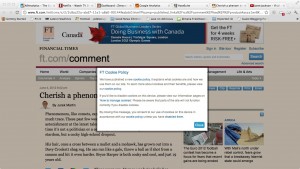Analytics capability grows with each new mobile device user, but so does the interest in the Do Not Track initiative. As I sat in on a review last week of the initiative, I could not help but wonder how analytics will grow from its adoption.
Mozilla, maker of the Firefox browser, hosted Opting In To Do Not Track: A Morning Mini-Conference On Privacy, Tracking, and More, a fast track review as part of Internet Week New York events last week. Alex Fowler, Global Privacy Leader at Mozilla, was the moderator. The four-hour overview aimed to provide marketers information on the Do Not Track initiative with representation from Mozilla, Federal Trade Commission, and W3C. Twitter heightened attention for Do Not Track, ironically, as it announced its support of the Do Not Track initiative.
Do Not Track is a standardized privacy initiative supported by the Federal Trade Commission, online privacy advocates and internet service provides like Mozilla.
Website browsers have recently included a "Do Not Track" option that sends a line of code to websites indicating the user does not want to be tracked for behavioral advertising. Under current regulations, it is up to the user to select the feature and for hosting websites to honor the request.
Do Not Track is a privacy feature included in Firefox, Internet Explorer, Opera, and Safari. Fowler noted that Google will add Do Not Track to its browser Chrome this year.

European organizations like The Financial Times have begun to indicate tracking is being used on their sites. Confusion remains on compliance
Mozilla has been leading the Do Not Track discussion among browser manufacturers. It introduced an analytic browser plugin called Collusion.
Collusion helps the user determine view all the third parties that are tracking movements, displaying a mapped connection of the tracking sites with which the user has interacted.
Fowler’s opening remarks captured the challenge of creating a user experience such that the DNT is understood easily. “The driver for this is that we are in a data driven environment in which volunteering information is being used for the personal experience…Thinking about how to control that experience better is part of this discussion. The problem is that there is a tremendous onus on the user to figure out what works.”
Fowler also emphasized Mozilla’s perspective on privacy. To maintain the opt-in nature of DNT, Mozilla never installs DNT technology that is “on” by default. The user must seek out the feature in the browser to indicate their preference. “We will not ship DNT preinstalled as “on” in Mozilla products,” says Fowler.
I enjoyed two very astute panel observations. I was particularly taken by comments from Brad Burnham, Partner at Union Square Venture – one of the leading venture capital arms in the burgeoning New York technology start up community. In his presentation, Burnham suggested that a political solution would freeze development.
Burnham imagined companies shifting their focus to “demonstrating some level of compliance and provide a privacy officer. Budgeting to train a third person in compliance is a burden for the two person app developer. And most of our advances are from these smaller businesses.”
“The end result would entrench the incumbents - Facebook, Apple, Google, Microsoft will dominate – they will have the resources to comply where a two person shop will not.”
Because analytics is difficult for a 2 person operation to apply while developing an app, Burnham says that " third parties who can provide analytics services can and should exist in the ecosystem". Burnham also suggested developers to think about the same real time access to data from users and providers
Internal API – multiple service reading from the same data – user would have to access to a read-write API. If the User could have an API key – you can do analytics to learn what people know about you (Collusion)
Another view of Do Not Track Self-Regulation and consumer trust comes from Ed Felten, Chief Technology Officer for the Federal Trade Commission. Felten explained that an effective Do Not Track option:
He reinforced comments from Fowler and Burnham.
“With an effective do not track, consumers can make a choice and enter a dialogue with a company. Company will decide how to response – fine, we’ll do what you are asking for; no we will not accept your business because we will not do X,Y, and Z; yes, we would like to convince you why this is option is better.
“Third parties will start to respect the choice consumer make. First parties will begin to insist that third parties respect their customers choice.”
Felten imagines that companies that defy do not track will be at a disadvantage, as consumers will limit their involvement with companies that stand outside a system. The response would be a broad consensus.
As more analytics service providers grow, from the small consultancy to the larger firm, the idea of a third party representing the first is being examined. Felten expressed these thoughts: “I think the conversation about party responsibility should enter contemplation when hiring someone to perform a service – if you can implement analytics, it’s ok to hire, without being a backdoor for broader dataflow.”
You can also learn further information at Mozilla’s Do Not Track site as well as about other initiatives at the independently run donottrack site, supported by Stanford University researchers (Jonathan Mayer and Arvind Narayanan). In addition, Felten contributes to a blog hosted by Princeton's Center for Information, Technology Policy, which focuses on civic community issues and technology.
Sound off here about what you foresee for businesses as a challenge for adoption to Do Not Track.